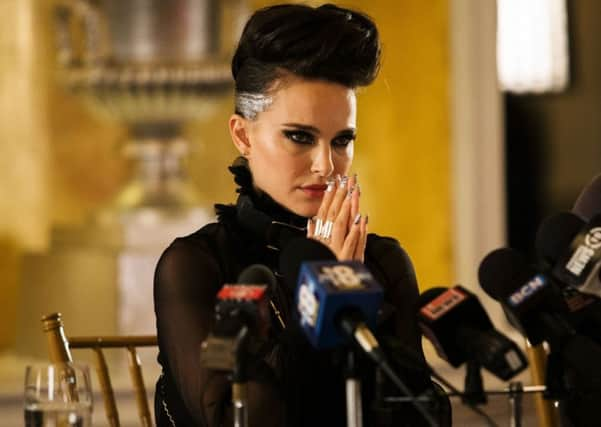Film reviews: Vox Lux | Tolkien | The Curse of La Llorona | Long Shot | Extremely Wicked, Shockingly Evil and Vile


Vox Lux (15) ****
Tolkien (12A) **
Extremely Wicked, Shockingly Evil and Vile (15) ***
The Curse of La Llorona (15) *
Long Shot (15) **
With his second feature, Vox Lux, former child actor Brady Corbet establishes himself as an American filmmaker as committed as any of the European arthouse heavy-hitters he worked with to making singular films about the human condition. Setting his sights on the anxieties of the digital age, he’s made a fascinating, elliptical chronicle of America in the 21st century so far, one that kicks off in 1999 with an upsettingly rendered Columbine-style high school massacre, then uses the journey of one of its survivors, Celeste, to take the pulse of the country as she becomes a stadium-filling pop-star – one we then rejoin as an adult on the comeback trail after she goes spectacularly off the rails in the intervening years.
Played as a jaded and damaged adult by Natalie Portman – Raffey Cassidy plays her as a teen in the
Advertisement
Hide Adearly part of the film and returns to play the character’s daughter in the second half – Celeste is an embodiment of a messed-up country’s worst impulses. Which sounds a little baroque and the film undoubtedly is, but Corbet’s willingness to approach his subject matter with the freedom of a novelist or a painter and push the form on a scale that feels simultaneously grand and intimate is thrilling to watch.
Disavowed by the estate of John Ronald Reuel Tolkien, Tolkien, the new biopic starring Nicholas Hoult as the fantasy novelist, is a pretty dreary attempt to reverse engineer aspects of The Hobbit and The Lord of the Rings trilogy (or, at least, vague enough allusions to Peter Jackson’s film versions so as not to be actionable) in order to make overly simplistic correlations with his early life story. Jumping back-and-forth between his traumatic wartime experiences at the Battle of the Somme and his school and university years, the film dedicates most of its running time to exploring how these events shaped the imagination of this orphaned scholar, whose love of language would eventually lead him to write about hobbits and elves and epic journeys featuring great friendships and huge sacrifices. Frustratingly, the film rather over-eggs all the connections – signposting, for instance, the secret society he formed in Birmingham with three close school friends as a “fellowship,” or making winking reference to Wagner’s Ring cycle. Most egregious of all is the way in which German soldiers with flamethrowers take flight as wispily rendered dragons while Tolkien stumbles through the trenches into the limb-strewn hell of no man’s land. Directed by Dome Karukoski, who made Tom of Finland (an oddly conservative biopic of the titular underground gay icon), the film fails to drill down into the creative process in any meaningful way. Lily Collins co-stars as Tolkien’s eventual wife, Edith Bratt.
Collins turns up again in Extremely Wicked, Shockingly Evil and Vile, this time as the longterm girlfriend of Ted Bundy. Directed by acclaimed documentarian Joe Berlinger (Paradise Lost) – who has also directed the recently released Netflix documentary series Conversations with a Killer: The Ted Bundy Tapes – the film feels at first like another artfully made serial killer biopic in the My Friend Dahmer mode. Gradually, though, it morphs into a mildly intriguing look at the cult of personality that Bundy’s case seemed to galvanise as his crimes and subsequent televised trial – the first in the United States – fuelled a media circus in which justice for his victims seemed secondary to his status as a ratings and political vote booster. Starring Zac Efron as Bundy, the film casts the former teen idol against type in order to capitalise on his looks as a way of explaining how Bundy was able to hide in plain sight and seduce his victims. But while this approach works to a degree (Efron is solid in the role), the film’s attempts to create some ambiguity around Bundy’s guilt for dramatic purposes starts to feel like a disservice to the 30 known victims whose stories the film, like the media it’s critiquing, doesn’t seem all that interested in exploring.
As hokey as the various supernatural spook fests spun off from The Conjuring movies are – the cinematic horror universe includes two Annabelle instalments (that’s the one about the demonic doll) and last autumn’s The Nun – they have thus far been made with a degree of craft that ensures the odd scare. Not so The Curse of La Llorona, a weak, shoddily executed 1970s-set story about centuries-old infanticidal Mexican ghost. At the centre of the film is Linda Cardellini (Avengers: Endgame, Green Book), a talented actress wasted here in an all-too-rare lead role that requires her to be a dutiful cop’s widow trying to protect her two children from the film’s poorly articulated and rendered folkloric demon.
Coincidentally, Cardellini’s former Freaks and Geeks co-star Seth Rogen also returns this week in Long Shot, a disappointingly laugh-light high-concept rom-com in which Charlize Theron’s presidential hopeful falls for his angrily idealistic journalist after he joins her campaign as a speech writer. The characters have a history – Theron’s used to babysit Rogen’s – but Rogen’s default schlub-with-a-heart-of-gold persona wears very thin, very quickly and Theron can’t do much with a role that recycles diluted versions of the ribald routines we’ve seen in the countless Rogen comedies since Knocked Up. ■